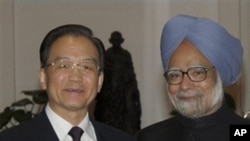China and India have signed six agreements, including business deals worth $16 billion, as part of Premier Wen Jiabao's visit to New Delhi. China also says it takes seriously India's concerns about regional security.
Chinese Premier Wen Jiabao vowed to reach a "strategic consensus" with India that reflects what he describes as a higher level relationship between the two rising world powers.
Following summit talks between Mr. Wen and Indian Prime Minister Manmohan Singh, the two nations signed agreements ranging from banking to climate change, and set a target for two-way trade worth $100 billion by the year 2015.
The two leaders did not hold a joint press conference, but Indian Foreign Secretary Nirupama Rao told reporters the summit included frank conversations about regional security. "Our concerns about terrorism emanating from Pakistani soil were expressed ... I think the Chinese Premier was given a very clear understanding," Rao said.
China is a major strategic partner of Pakistan, which India accuses of backing the Mumbai terrorist attacks of 2008. India has often expressed concern about Beijing's military and nuclear cooperation with Islamabad.
India also sees a challenge to its sovereignty in China's policy of issuing stapled paper visas to travelers from India's Jammu and Kashmir state, which is claimed in part by Pakistan. Rao says the Chinese leader was proactive Thursday in addressing the issue. "In fact Premier Wen Jiabao brought it up himself," he says, "He said China takes our concern on this issue very seriously."
Rao says Mr. Wen proposed future talks to resolve the issue, but did specify any immediate action on China's part.
"In a sense the ball is in their court, there is no doubt about that," Rao said.
The two sides vowed to continue strengthening confidence building measures to avoid tension along a vast disputed border in India's northeast. China claims the entire Indian state of Arunachal Pradesh, which Beijing labels "Southern Tibet." Rao confirmed a hotline between the two leaders' offices had been in operation for several days.
Premier Wen stopped short of an explicit endorsement of India's bid to sit next to China as a permanent member of the United Nations Security Council, but offered a general statement of support.
"They understand our aspirations to play a bigger role in the United Nations, including in the U.N. Security Council, and that China particularly supported the interests of developing countries in this regard," Rao states.
Rao says India and China will cooperate on closing a trade gap in China's favor, and that Delhi is still pushing for more Chinese market access on key industries such as pharmaceuticals, agricultural products, and information technology.
The Indian prime minister will have another chance to pick up those matters soon: Indian officials say Premier Wen extended an invitation for him to visit early next year.
Chinese Premier Vows Cooperation on Sensitive Issues With India




